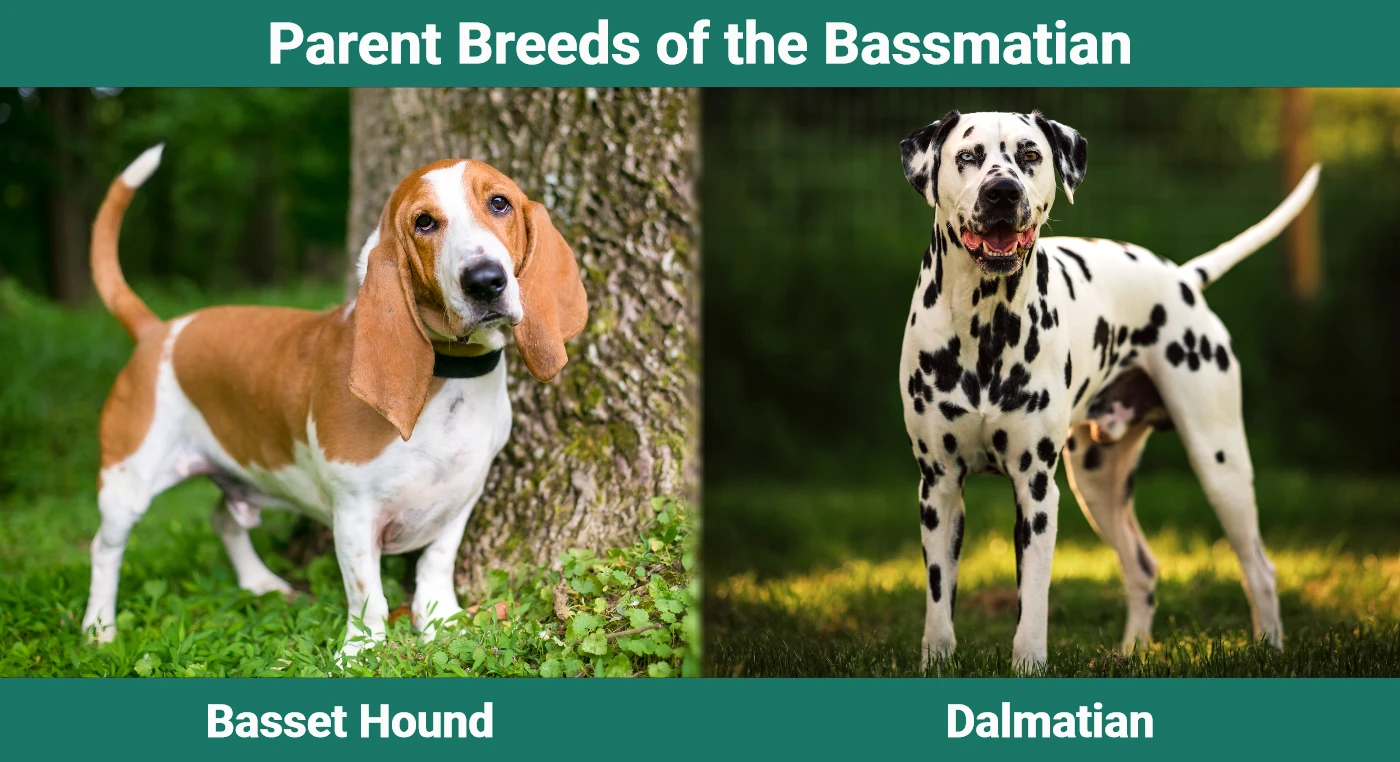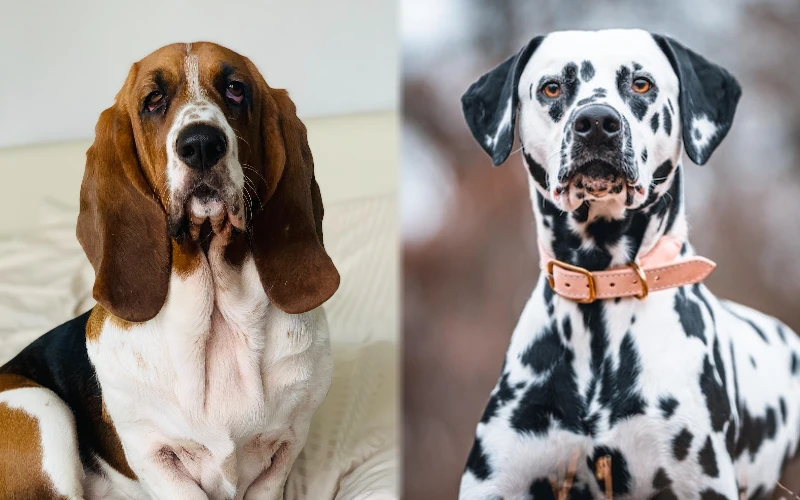Click Below to Skip Ahead
Bassmatians are an intriguing blend of the Basset Hound’s laid-back charm and the Dalmatian’s vibrant energy, creating a breed that’s stealing the spotlight. These dogs are charismatic and affectionate and have a uniquely attractive spotted coat that guarantees second looks from fellow pet lovers.
Their personality is as fascinating as their appearance—they’re social, smart, and surprisingly adaptable. Whether you’re a seasoned pet parent or a first-time dog owner, the Bassmatian’s balanced characteristics make them an ideal choice.
Breed Overview
Height:
20–24 inches
Weight:
45–65 pounds
Lifespan:
12–14 years
Colors:
White, black, brown, spotted
Suitable for:
Active families and single people, seniors
Temperament:
Intelligent, loving, active, playful
The Bassmatian brings together the charming characteristics of the Basset Hound and the lively personality of the Dalmatian, creating a delightful blend of traits. Known for their unique appearance, friendly demeanor, and adaptability, Bassmatians are becoming a popular choice for families, couples, and singles alike.
Bassmatian Characteristics

Bassmatian Puppies
Just like their parents, Bassmatian puppies are absolutely adorable. Their playful spirit and cute, spotted appearances can melt anyone’s heart instantly. Although these puppies are not as prevalent as some of the other breeds, their unique charm makes the pursuit worthwhile.
As these are a specialized breed, you may need to reach out to breeders who specifically deal with Bassmatians. When you do, it is crucial to work with a breeder who puts the health and wellness of their dogs above all else. The likelihood of adopting a healthy pup will be much greater.

Temperament & Intelligence of the Bassmatian
Bassmatians are blessed with a combination of the best traits from their parent breeds. They have the Basset Hound’s friendly, lovable nature and the Dalmatian’s notable intelligence, making them wonderfully balanced pets.
While they have a playful and affectionate side, Bassmatians are also known for their bright minds. These dogs are keen observers, quick learners, and have a natural curiosity that keeps them engaged with their surroundings.
However, they can sometimes exhibit a streak of stubbornness—a trait they likely inherit from their Basset Hound parent. This trait isn’t necessarily a drawback; with the right training approach, their stubbornness can be channeled into determination.
Are These Dogs Good for Families?
Bassmatians are highly adaptable, making them an excellent match for various home environments. They can comfortably fit into a bustling family with children or a quiet home with a single owner.
Their friendly disposition, paired with their patient and gentle nature, makes them great with children. Bassmatians are not only protective but also love engaging in play, making them a cherished addition to any family.
Does This Breed Get Along With Other Pets?
Bassmatians generally have a peaceful demeanor and can coexist harmoniously with other pets. Their sociable nature allows them to interact well with other dogs and even cats. It is essential, though, to have proper introductions and supervised interactions initially to ensure a smooth transition.

Things to Know When Owning a Bassmatian:
Food & Diet Requirements
Feeding your Bassmatian a well-balanced diet is essential for their overall health. Their meals should include a good mix of proteins, carbohydrates, and healthy fats. It is crucial to opt for high-quality dog food that caters to their specific size and activity level.
Also, keep an eye on their calorie intake as they may be prone to weight gain due to their Basset Hound lineage. Regular vet checkups will help you adjust their diet according to their specific needs.
Exercise 🎾
Despite their laid-back Basset Hound roots, Bassmatians do have a lively side inherited from their Dalmatian parent. To keep them fit and content, ensure they get regular exercise. This includes daily walks, playtime in the yard, and mental stimulation activities such as puzzle toys or obedience training.
Training 🐕
Bassmatians, while intelligent, may show a slight stubborn streak at times. To handle this, implement a consistent, reward-based training approach. Positive reinforcement methods work wonders with them, promoting good behavior and making the training sessions an enjoyable experience for both of you.
Grooming ✂️
Bassmatians sport a short, dense coat that requires weekly brushing to keep it healthy and shiny. Regular baths, depending on their activity levels, will help keep their coat clean and free from potential skin issues.
Their dental hygiene shouldn’t be overlooked either—regular teeth cleaning is essential to prevent dental diseases. Furthermore, their nails should be trimmed regularly to prevent overgrowth and the issues it can cause. Regular grooming is a fantastic opportunity to bond with your Bassmatian while ensuring they look their best!
- See Also: 11 Best Dog Shampoos
Health and Conditions
Every breed has its specific health predispositions, and the Bassmatian is no different. This hybrid dog inherits its health conditions from its Basset Hound and Dalmatian parent breeds. While generally healthy, they can be prone to a few serious and minor health conditions, which prospective owners should be aware of.
- Allergies
- Obesity
- Cherry Eye
- Bloat
- Ear Infections
- Cataracts
- Hip Dysplasia
- Cancer
- Intervertebral Disc Disease
- Bladder Stones
Male vs Female
When it comes to Bassmatians, both males and females share quite a bit of similarity in terms of size and temperament, with minor differences that can vary from dog to dog. Typically, males might be slightly larger in size compared to females, but the difference isn’t significant.
As for temperament, both genders exhibit the loving, friendly, and intelligent nature inherent in the breed. However, individuals can have unique quirks and traits, some of which may seem more prominent in one gender than the other. For instance, males can sometimes be more assertive, while females might be slightly more independent.
That said, these characteristics can be influenced by various factors like training, socialization, and overall environment. Therefore, it’s crucial to interact with your potential pup, understand its personality, and see how well it aligns with your lifestyle before deciding.

3 Little-Known Facts About the Bassmatian
1. Their sense of smell is remarkable.
Bassmatians have inherited a powerful nose from their Basset Hound parents, which gives them an exceptional sense of smell. This trait not only allows them to excel at tracking games but also stimulates their mind and keeps them engaged. It’s always a good idea to incorporate scent-based games into their playtime, providing them with both physical exercise and mental stimulation.
2. They are known for their unique “smiles”.
If you’ve ever seen a Bassmatian “smiling,” you know just how delightful it is. These dogs have a charming way of expressing their joy by pulling back their lips, giving the impression of a doggy smile. It’s one of their quirkiest and most endearing traits that never fails to melt hearts!
3. Each Bassmatian’s spots are unique.
Every Bassmatian is a work of art with a distinctive pattern of spots that is unique to each individual. Much like their Dalmatian parent, no two Bassmatians have identical spots. This singular feature adds to their charm and makes every Bassmatian truly special and one-of-a-kind.

Final Thoughts
Bassmatians, with their unique looks, friendly nature, and adaptable disposition, are a joy to have around. They offer a perfect mix of the Basset Hound’s easy-going temperament and the Dalmatian’s vibrant energy.
Whether you are a large family, a single individual, or a senior, a Bassmatian could be the ideal addition to your home. Their loyalty, intelligence, and undeniable charm make them a breed worth considering for your next four-legged family member.
Featured Image Credit: Left – Marek Perička, Pexels | Right – Jozef Fehér, Pexels










